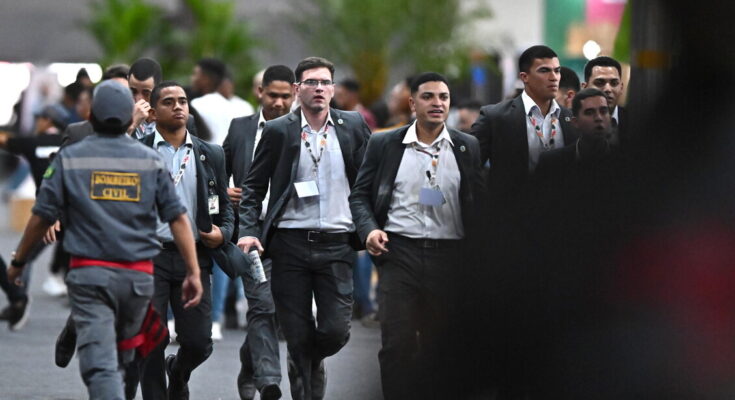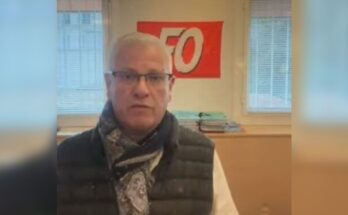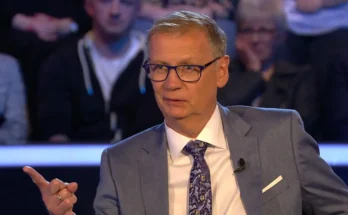Fire alarm at COP30 in Belem in the pavilion area. The participants were evacuated to the green zone, on the other side of the complex.
The fire apparently occurred in the Youth pavilion area, near the Italy pavilion. People started running, shouting “fire! fire”. Fire trucks and ambulances immediately rushed to the scene, but currently there are no casualties. Governor Helder Barbalho told TvGlobo that the technical team is working on two hypotheses: a fault in the generator or a short circuit in the stand. According to him, there were no casualties and his party was waiting for the green light from the fire brigade to continue activities in the area.
Cop30, fire alarm
At COP30 in Belem, a proposal from the European Union to Brazil’s climate conference president arrived for an energy transition roadmap and protection of forests and ecosystems. This agreement was reached after long coordination and also considering the stickiness of Italy, which until now has not given its support to the roadmap out of fossil fuels. The European proposal “encourages all Parties to accelerate the implementation of global efforts” in a “nationally determined manner, reflecting the shared but differentiated responsibilities and capacities of each, given different national conditions, to limit global temperature rise to 1.5°C above pre-industrial levels”.
The EU – we read in the text – decided to launch the Mutirao Roadmap under the guidance of the current and future COP Presidencies”, for indicated objectives including the transition from the use of fossil fuels “in a fair, orderly and equitable manner”. Meanwhile, Brazilian President Luiz Inácio Lula da Silva returned to COP30 today, giving new impetus to the final stages of negotiations about climate. In his meeting with the European Union – attended by Portugal, France, Germany and Denmark – Lula discussed a complex document on a “path” to phase out fossil fuels, which Brazil wants to turn into an official decision of the conference.
Portuguese Environment Minister Maria da Graça Carvalho explained that Brasilia aims to achieve results that combine ambition in mitigation and support for adaptation, highlighting the vulnerability of developing countries and island nations. Brussels is ready to compromise, despite resistance from major oil producers. Lula’s return to Belém – a rare event in the history of the COP – aims to resolve the still unresolved issues, after the Brazilian presidency asked the countries to express their opinion on this matter. four main themes: strengthening NDCs, criteria for distributing $300 billion for adaptation, regulations on climate-related trade barriers and greater transparency in reporting. Meanwhile, pressure is mounting from 82 countries to include detailed pathways away from fossil fuels, which are seen as critical to maintaining the +1.5°C goal in the Paris Agreement. Lula also met with a group of scientists, who gave him a proposal for the creation of a scientific panel responsible for developing it global roadmap to eliminate fossil fuels. “We have made it clear that net zero must happen by 2040 and no later than 2045. The president received the message and did not differ,” said Carlos Nobre, a meteorologist and member of the IPCC, the Intergovernmental Panel on Climate Change. Nobre added that Lula had repeatedly defined COP30 as “the most important COP”.
Scientists worry that disputes between rich and poor countries and resistance from major oil exporters could undermine any real sign of an energy transition. Marcio Astrini, from the Climate Observatory, reported that Lula was committed to this defend the roadmap” at the COP, at the G7, at the G20 and wherever necessaryIn the field of internal politics at Cop30, the president also met with negotiators from China, India, India and Arab countries, as well as delegations of Brazilian and international mayors. Caterina Sarfatti, director of the global C40 network, called for the inclusion of local governments in the negotiation text, noting that similar dynamics had produced historic results in Paris and Dubai. The indigenous people’s front is also very decisive: Dinamam Tuxá, coordinator of Apib, Articulation of Brazil’s Indigenous Peoples, called for new demarcations and the inclusion of “Nationally Determined Contributions of Indigenous Peoples” as a measurable climate policy. Cop30 is coming to an end the day after tomorrow, with Lula busy in a last-ditch effort to bring a political turning point to the negotiating text, which is still stalled.
Reproduction protected by law © Copyright ANSA



